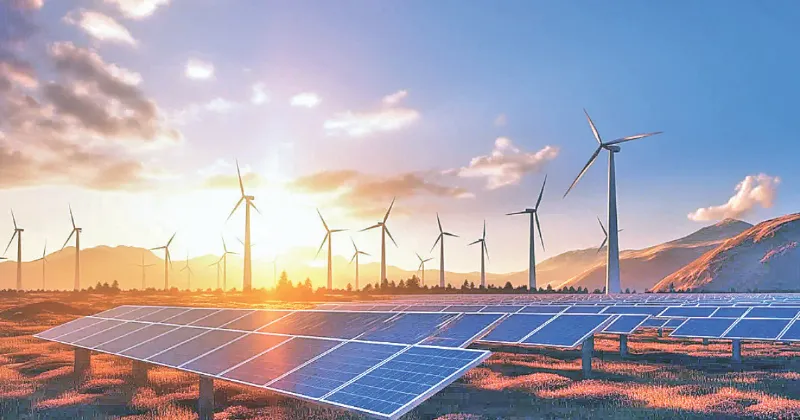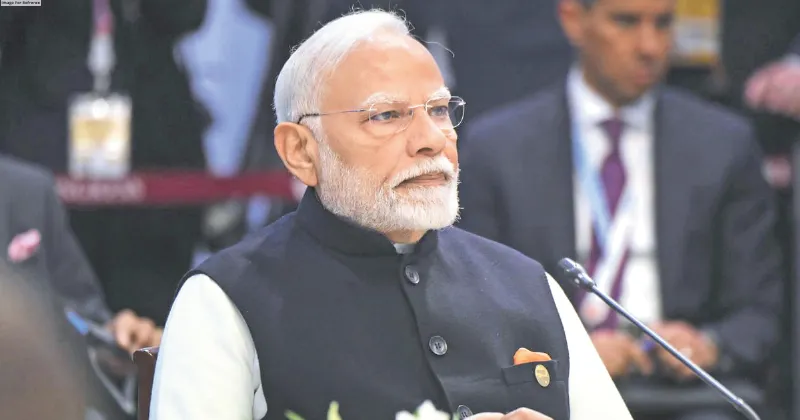Latest News
INDIA TOWARDS RENEWABLE ENERGY

Once again, the energy sector has begun a topic of global debate. This is an indication of the increasing importance of the energy sector. But why are the countries thinking so seriously about it? Raising this issue on global forums shows that the dangers of the coming times are very big. Actually, the world is facing crises in the energy sector. Everyone has understood that if serious attention is not given to this now, the coming times will be so challenging. The emerging energy crisis, depleting fossil fuel resources and high oil prices along with climate change concerns have drawn global attention towards the development of renewable, alternative, environmentally friendly and carbon neutral fuels to meet growing energy demands. Most energy crises have been caused by local shortages, war and market manipulation.
There are many challenges in tackling the energy crisis in India. First of all, energy resources on the earth are limited. India has only coal, oil and gas as energy resources and it is dependent on imports to meet its growing energy demands. As a result, our country is looking for alternative sources of energy, such as solar, wind and hydropower. There is still insufficient investment in the country’s energy sector. There is a need for massive investment to improve the infrastructure and expand its energy capacity, but the government and the private sector are not able to invest enough in the energy sector. Low per capita income and high poverty rate also make it difficult for people to afford energy sources. India is one of the world’s largest greenhouse gas emitters and its energy sector is a major contributor to these emissions.
However, efforts are being made by the government to achieve the target of 500 GW of non-fossil fuel capacity by 2030 in terms of short-term and long-term renewable energy capacity addition. Meanwhile, India is emerging as a global leader in energy transition in the world. This is evident from the development that we have achieved in the field of renewable energy. The renewable energy sector is also showing promise in terms of employment generation. While the whole world is trying to develop the energy sector to prevent the threat of climate change, a developing country like India has achieved good success in the development of this source. During the last ten years, the country has increased its capacity of renewable energy production by five times. Along with this, new targets have been set in the field of energy production.
In terms of generating employment in the renewable energy sector, India is at fourth position in the world after China, Brazil and America. 5.7 percent of the people employed in the renewable energy sector in the whole world are in India. According to the report of the International Renewable Energy Agency, the renewable energy sector had generated four lakh jobs in India ten years ago. Actually, there is a lot of growth potential in the energy sector here. Therefore, if students take up this course, their career prospects will also be strong.
There are many courses like BTech Power, MBA Oil and Gas, MA Energy Economics, Solar Energy etc. in the energy sector, but in the coming times, the most potential is in solar energy. Opting this course would be beneficial for the students. Experts say that to make India a five trilliondollar economy, it will be necessary to revive the energy sector.
The use of LED bulbs in the country has reduced the electricity consumption for lighting by about 75 percent. Studies show that about 30 percent of electricity consumption can be reduced by the use of energy efficient devices, that is, there is a possibility of saving 1.20 lakh gigawatts of electricity in buildings. If energy efficiency standards are implemented in buildings, an additional 30 percent of electricity can be saved. This electricity is equal to the one-year requirement of states like Bihar and Jharkhand. According to the report of the Ministry of Statistics, the industry sector consumes the maximum electricity in the country, i.e. 42 percent. The domestic sector consumes 24 percent of electricity. Commercial buildings consume eight percent of electricity. The total consumption of the building sector is 32 percent, but the implementation of energy efficiency standards in buildings has been the lowest.
Talking about investment, the country’s energy sector has received foreign investment of $14.32 billion between 2000 and 2019. The government is paying special attention to this sector, due to which investment in this sector will increase further in the coming time. This will also increase job opportunities. By 2022, the Government of India has increased the capacity of renewable energy to 175 gigawatts. This includes 100 gigawatts of solar power and 60 gigawatts of wind power. India’s coal-based capacity is expected to increase from 191 gigawatts to 400 gigawatts by 2040. Although India has long relied on coal for energy production, the participation of green energy in it has been significant since the middle of the last decade. Since 2017, green energy has been at the forefront of new methods of power generation, in which solar energy has a large share.
At present, India’s energy dependence is more on other countries. Many initiatives are being taken to make the country self-reliant in the field of energy. In this context, renewable energy is playing an important role, for which a lot of work is being done by the government in the field of solar energy. India has set a target of zeroing carbon emissions by the year 2070, for which producing about 50 percent of the energy from renewable sources is a big target. By the year 2040, India has also set a target of producing 15,820 terawatt hours of electricity from renewable sources. In such a situation, solar energy can play an important role in achieving this goal. To achieve this goal, various companies are working rapidly towards solar energy. Due to this, good growth is being seen in the companies of this sector. In the coming time, with the growth of these companies getting faster, India will be able to successfully achieve all the goals of the energy sector.
THE VIEWS EXPRESSED BY THE AUTHOR ARE PERSONAL
Amit Baijnath Garg The writer is Senior Journalist






















